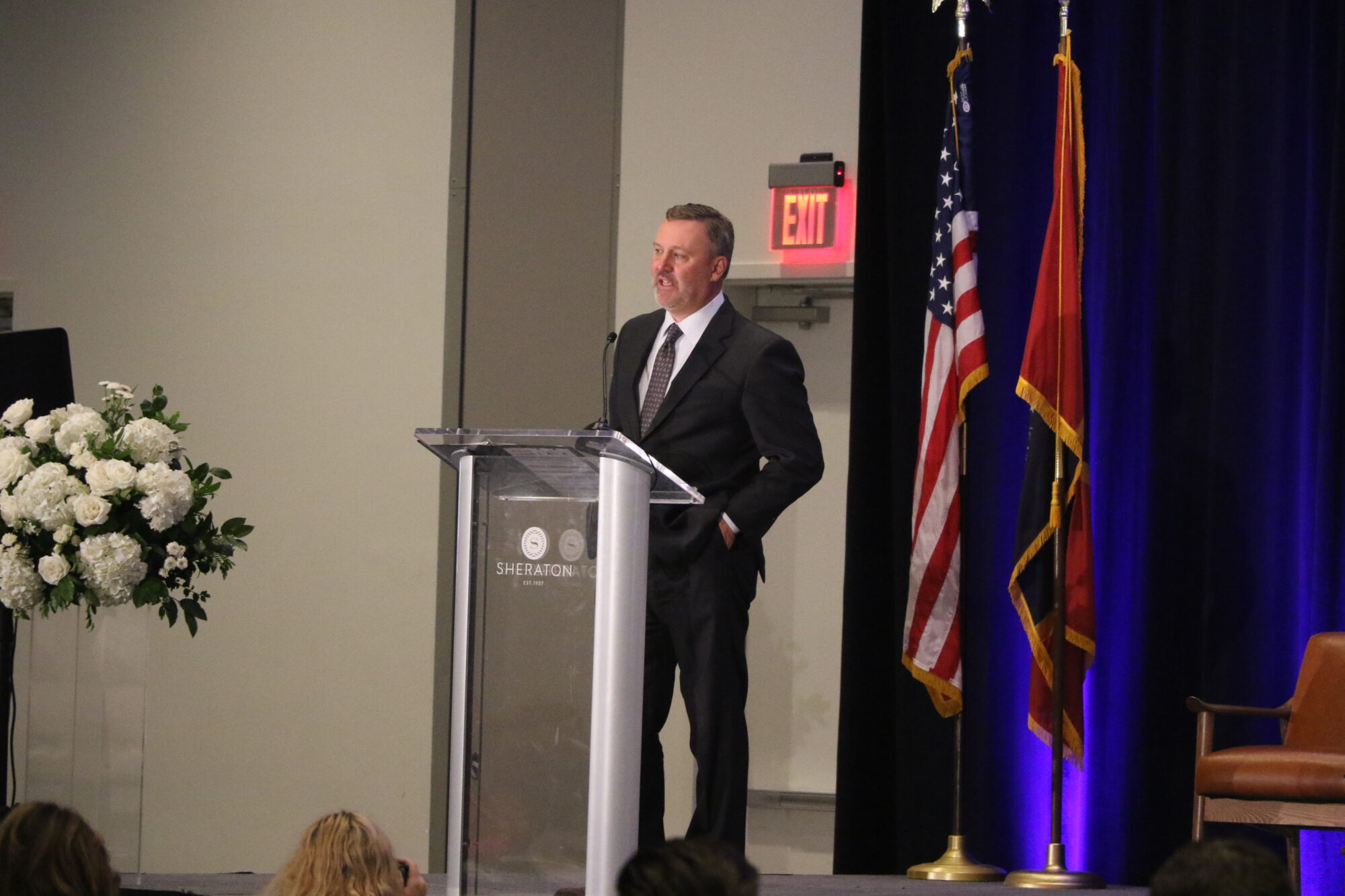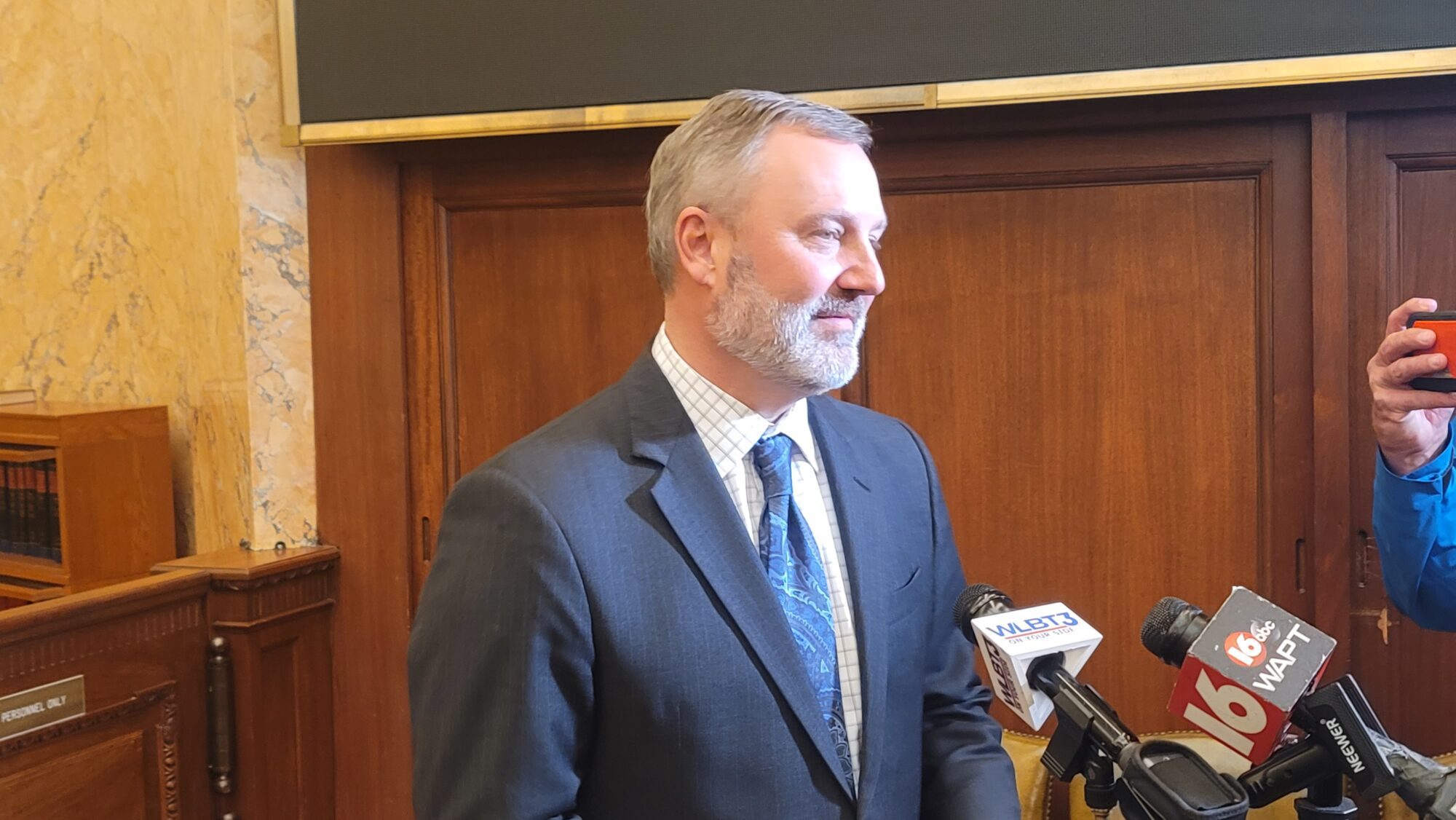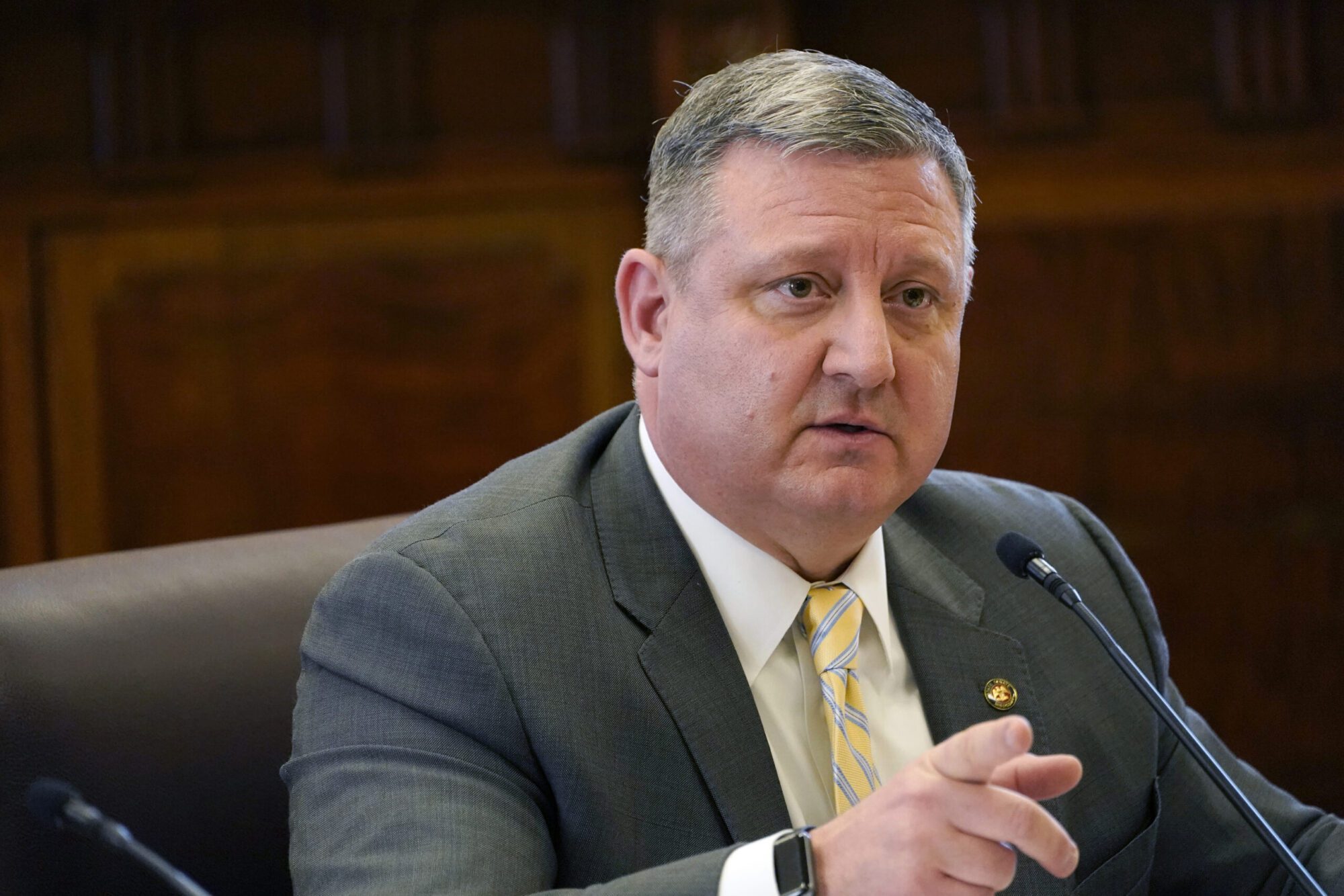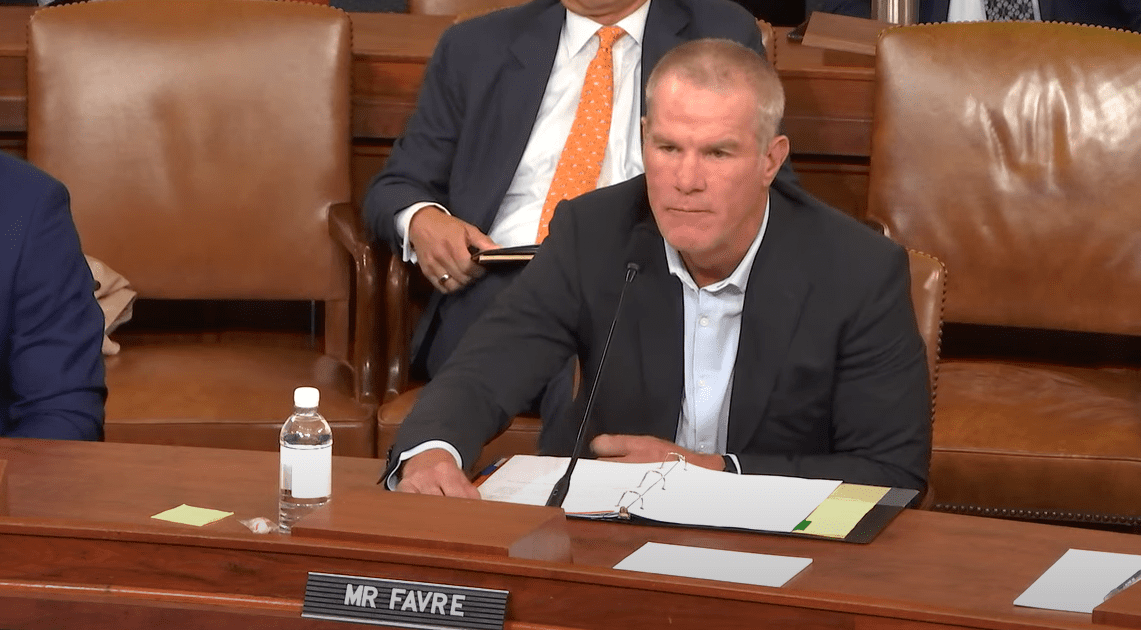
Brett Favre testifies at U.S. House Ways and Means Committee, Sept. 24, 2024 (From Committee LIvestream)
- The NFL Hall of Famer appeared at a hearing in the U.S. House Ways and Means Committee on Tuesday. Favre also announced that he was recently diagnosed with Parkinson’s disease.
NFL Hall of Famer Brett Favre appeared before the U.S. House Ways and Means Committee on Tuesday at a hearing exploring possible reforms to the Temporary Assistance for Needy Families (TANF) program.
Favre, who was invited to attend the hearing by Chairman Jason Smith (R) of Missouri, is among dozens of defendants in a civil lawsuit seeking to recoup misspent TANF funds. That lawsuit was filed in 2022 by the Mississippi Department of Human Services. The former quarterback has not been charged with any criminal wrongdoing.
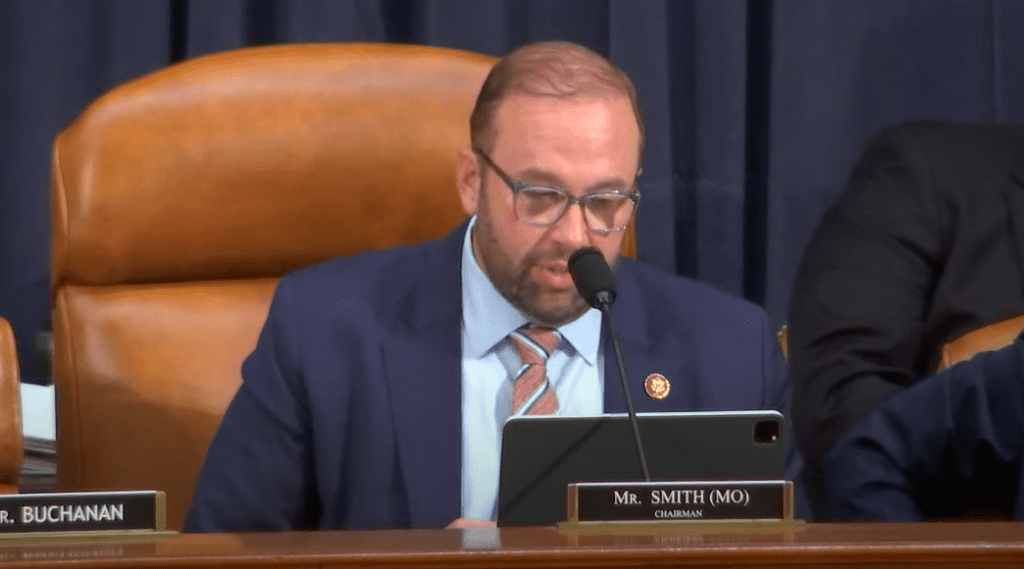
Favre has been accused of not fulfilling obligations related to payments totaling $1.1 million from a nonprofit that spent TANF funds received from MDHS. He has since repaid the funds, yet State Auditor Shad White and MDHS claim he owes the interest on the funds as well, over $700,000.
The nonprofit, Mississippi Community Education Center, was operated by Nancy New and her son Zach New. Both pleaded guilty in April 2022 to misspending welfare funds. They have reportedly been cooperating with authorities as they await sentencing.
As part of the scandal, over $77 million in TANF spending has been called into question between 2016 and 2019 in what Auditor White has called “the largest public fraud scheme in the history of the state.”
In his testimony on Tuesday, Favre, who revealed that he has recently been diagnosed with Parkinson’s disease, said when the welfare saga started, he did not know what TANF was. He believed the monies in question were coming through grants. Yet, what he and his family have gone through since Auditor White named him in the case has caused much pain, Favre said.
“Throughout my career there were many highs, many lows. Those lows helped me find out who I really am. They taught me to persevere, overcome challenges and succeed,” Favre said. “But the challenges my family and I have faced over the last three years because certain government officials in Mississippi failed to protect federal TANF funds from fraud and abuse and are unjustifiably trying to blame me, those challenges have hurt my good name worse than anything I faced in football.”
Favre told lawmakers that helping people in need is a cause dear to his and his wife’s heart. After learning what TANF program was meant for, Favre said he returned he funds he was paid “no questions asked” even though he knew he had not done anything wrong.
As for the volleyball stadium at the University of Southern Mississippi, where Favre played college football, that also received funds, the former Golden Eagle standout said his advocacy for the project was done to help his alma mater and benefit the community.
“Southern Miss introduced me to the nonprofit to see if they could help with the funding,” Favre said. “I had no way of knowing that there was anything wrong with how the state funded the project, especially since it was publicly approved by many state agencies and multiple attorneys, including the Attorney General.”
The approximately $5 million USM project was vetted and approved on more than one occasion by the Institutions of Higher Learning and former Attorney General Jim Hood’s office.
“I believe that I got swept up in a civil lawsuit at the instigation of State Auditor Shad White, an ambitious public official who decided to tarnish my reputation to try to advance his own political career,” Favre said.
White has since released a book chronicling the events from his perspective surrounding the scandal. Favre has sued White for defamation. Favre said White has profited from his position.
Parts of White’s book led the current Attorney General’s office under Lynn Fitch to remove themselves as White’s attorney and required him to seek outside counsel.
Favre told lawmakers the lack of guardrails, particularly around non-assistance spending must be addressed. Chairman Smith said non-assistance spending – funds that do not go directly to persons in need – accounted for 77 percent of the program funds.
“Importantly, I have learned that nobody was or is watching how TANF funds are spent. Our laws don’t sufficiently protect against TANF spending unrelated to helping people out of poverty. States have too much flexibility in how they spend this money which leads to waste and abuse,” Favre said. “We need mechanisms for oversight in TANF spending and greater clarity as to permissible uses of TANF funds. Democrats and Republican should agree, rampant state misuse of TANF funds is hurting efforts to help vulnerable families and children.”
Favre urged Congress to pass TANF reforms so that “what happened in Mississippi doesn’t happen again” and so those in need can receive the funds and taxpayers are protected.
Chairman Smith thanked Favre for appearing before the Committee, for “using your name and your platform to draw attention to the need for stronger federal safeguards in TANF spending to ensure what happened in Mississippi doesn’t happen again in other places.”
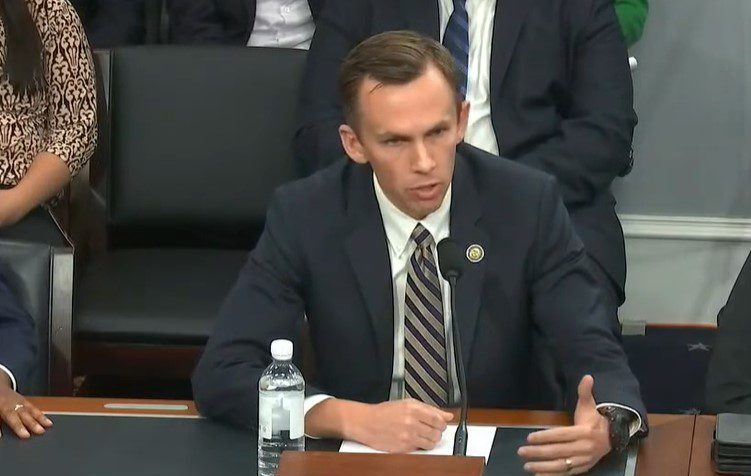
In July 2023, Auditor White appeared before a subcommittee for the House Ways and Means Committee related to the TANF fraud. The hearing was titled “Where is all the Welfare Money Going? Reclaiming TANF Non-Assistance Dollars to Lift Americans Out of Poverty.”
READ MORE: State Auditor White testifies before U.S. House subcommittee on Mississippi TANF scandal
“I would say the norm from 2016 to 2019 in Mississippi was for the dollars to be misspent rather than spent on an allowable purchase,” White told lawmakers last year. “It was really a tragedy that unfolded in a very short amount of time over the course of three to four years.”
Subcommittee Chairman Congressman Darin LaHood (R) of Illinois asked Auditor White what recommendations he had on how to ensure what happened in Mississippi did not happen again in his home state or in other states. White told the committee that the lack of monitoring was a primary concern.
White told lawmakers in 2023 that anytime the U.S. Department of Health and Human Services sees in a Single Audit from a state that an agency is not monitoring their subgrantees or non-profits “something needs to be done.” White suggested HHS send in federal agents, level penalties against the state agency, and investigate those non-profits.
Auditor White also suggested limiting access of non-assistance TANF funds to programs and services for persons under 200 percent of the poverty level, providing more constraints on the use of the funds.
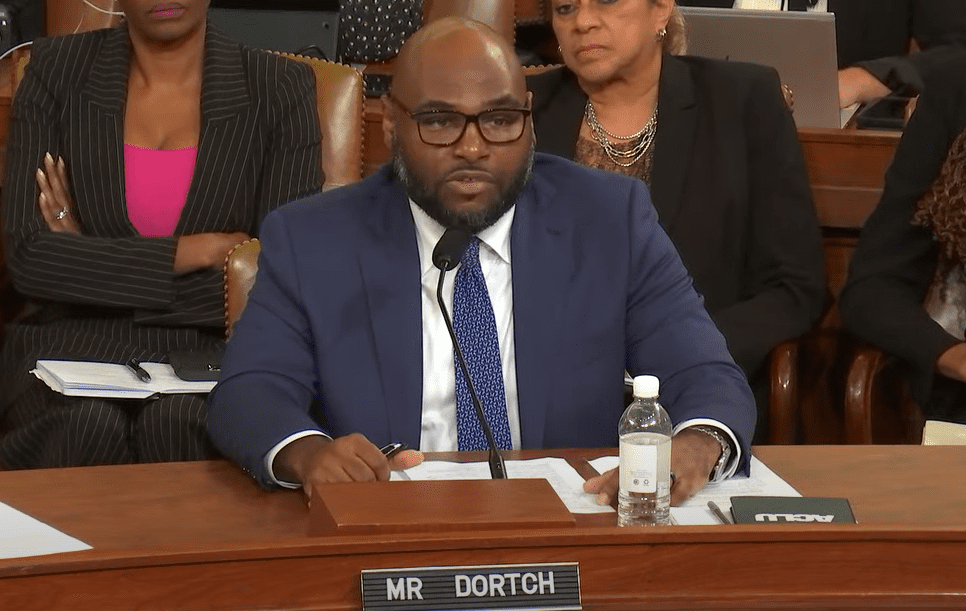
On Tuesday, former State Rep. Jarvis Dortch, now Executive Director for the American Civil Liberties Union (ACLU) of Mississippi, also appeared at the House Ways and Means hearing with Favre.
Dortch told Congress that “little in Mississippi has changed” since the scandal broke.
“Nearly five years later, little has changed. [State] Lawmakers have passed zero bills addressing the scandal. In fact, there have been zero hearings in the Mississippi Legislature on TANF,” Dortch said, adding, “Mississippi continues hoarding TANF money, with $145 million in unallocated funds.”
Dortch said MDHS still does not track the outcomes of funded subgrantee programs.
You can watch the full hearing below.





